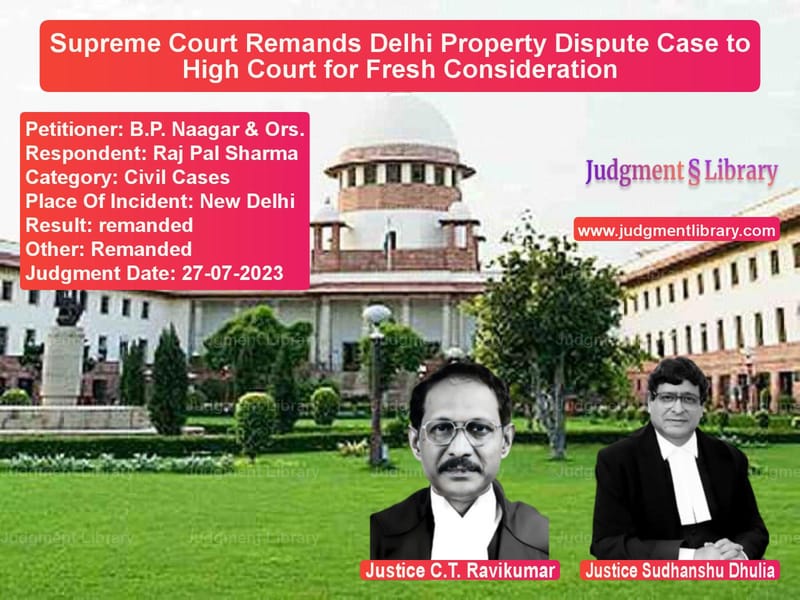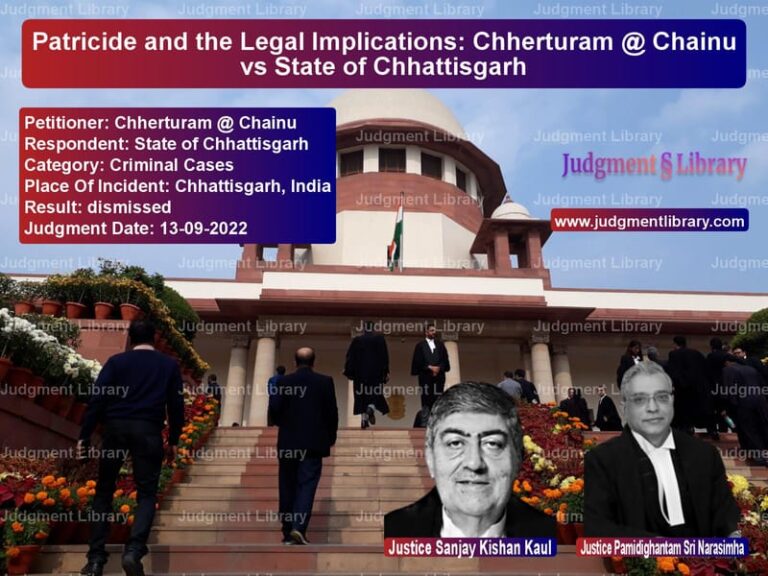Supreme Court Remands Delhi Property Dispute Case to High Court for Fresh Consideration
The case of B.P. Naagar & Ors. v. Raj Pal Sharma revolves around a property dispute concerning the validity of a gift deed and sale deed in Delhi. The Supreme Court set aside the High Court’s order and remanded the case for fresh consideration, emphasizing the necessity of proper court fee payment and jurisdictional clarity.
Background of the Case
The dispute centers around property House No. 173, E Block, Kamla Nagar, New Delhi. The legal battle originated over the ownership and transfer of the property through a gift deed and subsequent sale deed.
Key Developments Leading to Litigation
- 2011: The respondent filed a suit for declaration, cancellation of gift deed and sale deed, and permanent injunction.
- 2015: The High Court allowed the plaintiff to abandon two prayers and continue the suit for remaining claims.
- 2017: The Trial Court ruled that the suit was not properly valued and required additional court fees.
- 2019: The respondent sought to amend the plaint, but the Trial Court rejected the amendment request.
- 2019: The High Court permitted the amendment and directed framing an issue regarding valuation at the final stage.
- 2023: The Supreme Court remanded the case for fresh consideration.
Arguments Before the Supreme Court
Appellant’s Arguments
The appellants, the current owners of the property, argued:
- The plaintiff had originally valued the suit at Rs. 1 crore but failed to pay the required ad valorem court fees.
- The Trial Court correctly applied the law by rejecting the suit under Order VII Rule 11 CPC.
- The High Court’s decision to allow an amendment circumvented the requirement for court fee payment.
- The proper remedy for the plaintiff was to file an appeal, not a petition under Article 227 of the Constitution.
Respondent’s Arguments
The respondent, who challenged the validity of the property transactions, countered:
- The amendment sought to correct a technical issue regarding the use of the words “cancellation” and “cancelling.”
- The High Court correctly ruled that the issue of valuation should be addressed at the trial stage.
- The Trial Court’s order was procedural and did not justify outright rejection of the plaint.
Supreme Court’s Analysis and Judgment
A bench comprising Justices C.T. Ravikumar and Sudhanshu Dhulia ruled that the High Court had not adequately considered key legal questions before allowing the amendment.
Key Observations of the Court
1. Procedural Errors in High Court’s Decision
“The High Court did not engage with the Trial Court’s reasoning on court fee valuation and jurisdiction.”
The Court emphasized that procedural fairness required a more detailed examination of these issues.
2. Amendment Should Not Evade Court Fee Requirements
“A plaintiff cannot avoid paying appropriate court fees by amending the plaint in a way that changes the nature of relief sought.”
The Court noted that the plaintiff initially framed the suit in a manner requiring higher court fees.
3. Right to Appeal Over Supervisory Jurisdiction
“When an alternative remedy exists, invoking Article 227 of the Constitution is not appropriate.”
The Court ruled that the plaintiff should have filed an appeal instead of seeking High Court intervention.
Final Verdict
The Supreme Court remanded the matter to the High Court, stating:
“The impugned order is set aside, and the High Court is requested to reconsider the matter within six months.”
The decision allows both parties to present their arguments afresh.
Impact of the Judgment
This ruling has several legal implications:
- Reinforces proper court fee payment: Plaintiffs cannot manipulate case valuation to evade fees.
- Clarifies amendment limitations: Changes that alter jurisdiction or court fees must be scrutinized.
- Sets a precedent for procedural fairness: Higher courts must carefully examine lower court findings.
Conclusion
The Supreme Court’s decision in B.P. Naagar v. Raj Pal Sharma underscores the importance of following due process in property disputes. The ruling ensures that amendments do not override jurisdictional rules and reinforces the necessity of paying the correct court fees in civil suits.
Petitioner Name: B.P. Naagar & Ors..Respondent Name: Raj Pal Sharma.Judgment By: Justice C.T. Ravikumar, Justice Sudhanshu Dhulia.Place Of Incident: New Delhi.Judgment Date: 27-07-2023.
Don’t miss out on the full details! Download the complete judgment in PDF format below and gain valuable insights instantly!
Download Judgment: b.p.-naagar-&-ors.-vs-raj-pal-sharma-supreme-court-of-india-judgment-dated-27-07-2023.pdf
Directly Download Judgment: Directly download this Judgment
See all petitions in Property Disputes
See all petitions in Contract Disputes
See all petitions in Specific Performance
See all petitions in Judgment by C.T. Ravikumar
See all petitions in Judgment by Sudhanshu Dhulia
See all petitions in Remanded
See all petitions in Remanded
See all petitions in supreme court of India judgments July 2023
See all petitions in 2023 judgments
See all posts in Civil Cases Category
See all allowed petitions in Civil Cases Category
See all Dismissed petitions in Civil Cases Category
See all partially allowed petitions in Civil Cases Category







